Summary of Candida by G. B. ShawPrefaceIn his collection of plays titled Plays Pleasant, writer George Bernard Shaw included a comedy titled Candida, initially published in 1898. James Morell, a minister, his wife Candida, and Eugene Marchbanks, a young poet vying for Candida's affection, are the main protagonists. What a woman wants from her husband is questioned in the drama, which challenges Victorian ideas of love and marriage. Being a Christian Socialist himself, Shaw can include contemporary political themes into the narrative because the clergyman is also a Fabian Socialist. 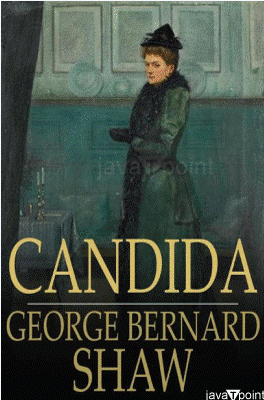
Shaw attempted to stage the play in London in the 1890s but was unsuccessful; nonetheless, there were two modest regional performances. But by the end of 1903, the play Shaw would write in 1904, starring actor Arnold Daly, had become so popular in New York that there was "an outbreak of Candidamania." In 1904, six matinees of the play were presented at London's Royal Court Theatre. From 1904 until 1907, the same theatre presented numerous further Shaw productions, including additional staging's of Candida. Introduction to the PlaywrightShaw, a writer, and novelist, was born in Dublin in 1856 and later migrated to London as a young man. He started creating his plays in the mid-1880s and became a reputable theater critic. His political awakening occurred around this time, as well. After reading Marx, he joined the Fabian Society. His opinions were frequently divisive and provocative. In his plays, which he wrote while adhering to a strict vegetarian diet, he expressed his views on politics and society. In 1898, at age 41, for both of them, Shaw wed Charlotte Payne-Townshend. They changed the name of their home in Hertfordshire to Shaw's Corner, and they stayed married until Charlotte's passing. 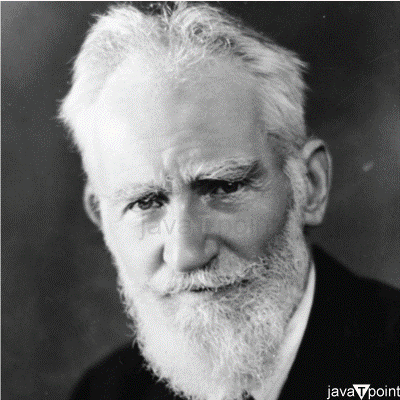
Early plays include Mrs. Warren's Profession, which the Lord Chamberlain initially forbade because it openly discussed prostitution, and Widowers' Houses, written a few years before it was performed. Although it would be some time until he would repeat its success, Shaw's first play to be a financial hit was 1894's Arms and the Man, inspired by Ibsen's writing. He kept up his writing and political activism. Shaw became a writer in the first ten years of the 20th century. Over five years, the Royal Court Theatre's Harley Granville-Barker group performed 14 of Shaw's plays. These were The Doctor's Dilemma (1906), Major Barbara (1905), and Man and Superman (1902), all of which were produced at the Court in 1905. Also becoming more formally experimental was Shaw's work. He created one of his best-performing plays, Pygmalion, in 1912. Sir Herbert Beerbohm Tree played a professor of phonetics, Henry Higgins, and Mrs. Patrick Campbell played cockney flower girl Eliza Doolittle in the 1914 London premiere of the play, which had its world premiere in Vienna. Up to his passing in 1950 at the age of 94, Shaw wrote a lot. Since then, the term "Shavian" has become widely used to describe Shaw's ideas and ways of expression. PlotThe drama takes place in October in the northeastern suburbs of London. It chronicles the tale of Candida, the wife of reverend James Mavor Morell, a well-known cleric. Candida is primarily to blame for Muchell's success even though he is a Christian Socialist and well-liked in the Church of England. Candida makes a quick visit home after visiting London with Eugene Marchbanks, a young poet who hopes to save her from what he assumes is her uninteresting home life. Candida is the love of Marchbanks' life, and she thinks her husband should show her more than simply complacency. She is magnificent in his eyes, and his devotion is unending. He believes it is wrong and degrading for Candida to be required to perform menial home tasks. The reality, however, is much different from Morell's belief that Candida requires his protection and care. Candida must ultimately pick one of the two males. Reiterating her preference for the "weaker of the two," she identifies her spouse Morell after a brief period of confusion. ThemeGeorge Bernard Shaw's play "Candida," initially published in 1898, is one of Shaw's recognizable comic plays and presents the iconoclastic viewpoints for which he is so well-known. The drama explores what a woman truly wants from her husband as its core theme, challenging Victorian ideas of love and marriage. The narrative of Candida, the wife of renowned minister Reverend James Mavor Morell, is told in the drama. Although Morell, a Christian Socialist, is a well-known orator and well-liked in the Church of England, much of his success may be attributed to his wife, Candida. 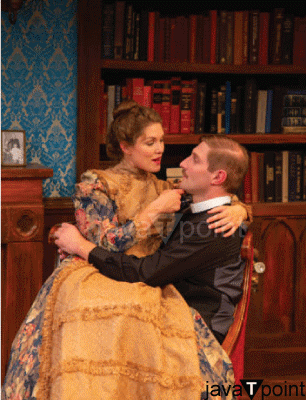
The play's primary theme is that women should be free to decide how to strike a balance between safety and freedom, domesticity, and unrestricted creativity. Candida is a strong female character who communicates and behaves straightforwardly or "candidly." In the end, she decides to place her attention on her husband Morrell instead of life, which is more viscerally compelling. By the play's conclusion, she has made up her choice as she declares, "I give myself to the weaker of the two." The issues involved are incredibly complicated and divisive. Shaw subsequently stated in his book Man and Superman, "Those who preach about the benefits of marriage and the fidelity of its vows are the identical ones who say that if the link were broken and the inmates were given the freedom to choose, the entire social fabric would fly asunder. Shaw has mercilessly shown the oppression and loss of independence that married women experience. The young man Candida is in love with, Eugene, proclaims that she wants "reality, truth, and freedom," with the truth referring to her marriage and liberation from the tie that ties her to her moralizing husband. Characters Of The PlayThe characters written below are in order of their appearance.
SummaryAct 1It's "a fine October morning" in the Victorian-era London suburbs. Working in the drawing room of the St. Dominic's parsonage with his secretary, Miss Proserpine Garnett, is the Reverend James Mavor Morell, a "first-rate" "Christian Socialist clergyman of the Church of England." Victoria Park, an "oasis" among the "desert of unattractiveness" of Morell's neighborhood, is visible from his windows. It becomes clear that Morrell is a highly busy man who frequently lectures when Morell and Proserpine try to locate a day in his calendar for him to deliver a lecture. The curate for Morell, the Reverend Alexander Mill, also known as "Lexy," shows up late for work. 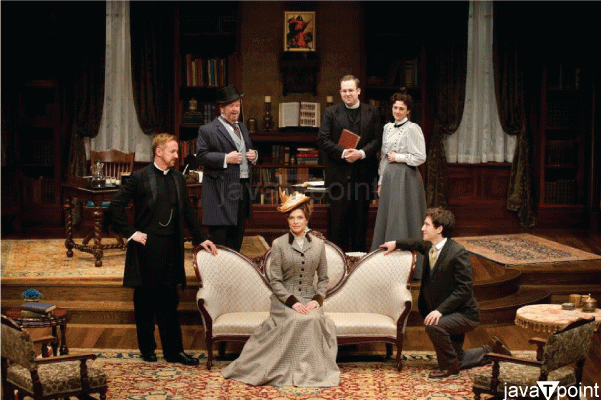
He expresses amazement at the news that Candida Morell's wife is leaving early from her vacation with their kids and worries that they could have measles. As Morell views marriage as a tremendous blessing, he commends his wife and advises Lexy to choose a wife for himself. Proserpine complains to Lexy about Morell's unceasing adulation of Candida after Morell departs. When Proserpine accuses Lexy of being envious of Candida because of her attractiveness, Lexy defends Candida's beauty. Candida's father, Mr. Burgess, shows up to see Morell, so Proserpine and Lexy go. It has been three years since Burgess last visited Morell, and they do not get along. They get into an old fight about how Burgess was denied a big contract because Morell had criticized him for giving his workers abysmal salaries. Burgess has now increased employee remuneration, but Morell recognizes that this is not the result of a genuine reformation. He refers to Burgess as "an apostate with [his] coat turned for the sake of a County Council contract," to which Burgess responds that he has an "unforgiving" (unforgiving) attitude. They manage to compromise despite their differences. 
When Candida came, the two guys had just settled their argument. Eugene Marchbanks, a poet who is eighteen years old, is with her. Morell spotted him sleeping outdoors the year before and brought him home. After learning that he is an earl's nephew, Burgess is thrilled to see Marchbanks. Marchbanks is a shy man who has trouble interacting with others and experiences anxiety when tipping cab drivers. Candida inspects the home's condition as Burgess departs for the train. Marchbanks tears and tells Morell how much he loves Candida but can't remain for lunch. This is mocked by Morell, who refers to it as "a case of calf love." Marchbanks responds that instead of the "reality, truth, and freedom" that Candida's soul longs for, it has only gotten "sermons" and "mere rhetoric." After a heated argument, Morell tells Marchbanks to go. Marchbanks is about to go when Candida returns and requests that he remain for lunch; Marthbanks agrees. Act 2In Morell's drawing room, Marchbanks is by herself. When Proserpine comes in, Marchbanks muses on how difficult it is to communicate one's desires. Proserpine is deeply moved and seems in love while annoyed by Marchbanks' beautiful rants. Marchbanks knows she is in love with Morell, even if she won't admit it. Marchbanks queries if a woman can fall in love with Morell, who has "nothing in him but... pious resolutions." Proserpine answers confidently, "Yes." 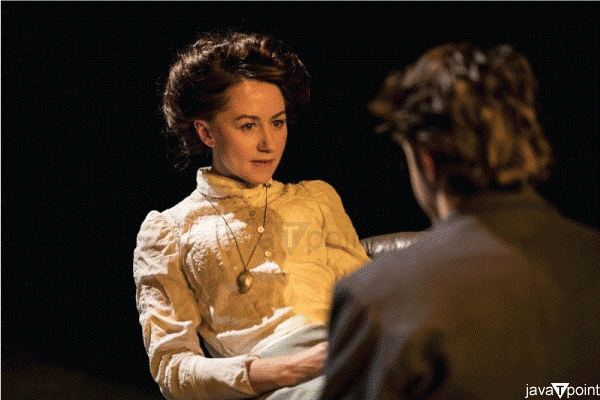
Proserpine and Burgess have a heated conversation when he enters the room before she is sent out. Morell is ecstatic to find Proserpine being so frank as he enters the drawing room. Marchbanks expresses horror that Candida is helping out around the house. When Candida shows up, Morell worries about Marchbanks' capacity to refute his claims and considers the younger guy a potential danger to his marriage. When everybody but Morell is gone from the drawing room, Candida worries that Morell is exerting himself too much. Candida claims that Proserpine and everyone else is in love with Morell. She believes that a man who doesn't have as much affection in his life?perhaps Marchbanks?might benefit more from her love. This substantially aggravates Morell. The speech Morell was scheduled to deliver that evening has been canceled. It is the first time the others can recall him postponing an event, but he says that he only wanted "ONE night at home, with [his] wife, and [his] friends." Morell reportedly canceled his presentation to keep a watchful eye on Marchbanks and Candida. But he changes his mind once again, and Morell decides to deliver his lecture while leaving Candida and Marchbanks at home alone to put their love for one another to the test. Act 3Marchbanks is reciting poems to Candida as they both sit in front of the fire. Candida nudges Marchbanks to express his genuine sentiments when he abandons his poetry because he sees he is boring her. She wants him to communicate from his "real self," not from "a gallant attitude, a wicked attitude, or even a poetic attitude." Marchbanks still hasn't confessed his love to Candida when Morell gets home. When Candida tells the maid she may spend the night at home, Morell asks Marchbanks whether he expressed his feelings. Marchbanks responds by saying he didn't and yelling, "Oh, you are not worthy to live in the same world with her." Morell is impatient and asks what occurred while Marchbanks is away as he expresses his perplexity about why Candida got married to Morell and extolled her in lyrical words. When Marchbanks says that he "wanted nothing more than the happiness of being in such love," Morell understands that Candida's genuine feelings for Marchbanks are still unknown. Morell worries that Candida won't have anybody to look out for her if she leaves him for Marchbanks. This idea is refuted by Marchbanks, who asserts that Candida is the one who needs protection and that he should provide it. 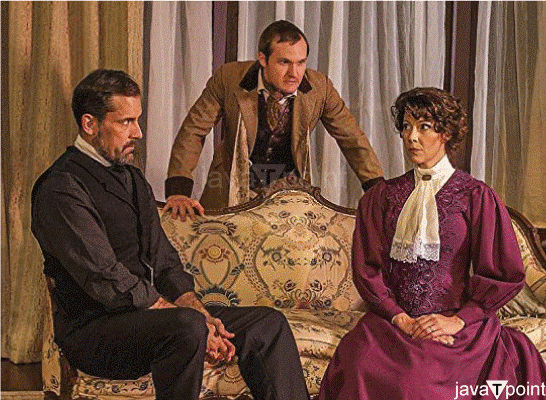
For Candida to choose between them, Marchbanks implores Morell to summon her to the drawing room. As Candida walks in, she notices Morell in anguish and tells Marchbanks to stop disturbing him, adding that she "will protect him." After being interrupted briefly by Lexy, Burgess, and Proserpine, who were also at dinner, Morell tells Candida about his disagreement with Marchbanks and demands that she make her decision. Candida begs both men for a "bid," saying it seems like she is "up for auction." Marchbanks gives his "weakness" and "heart's need," while Morell offers his "strength, provision, and authority."When asked who she offers herself to, Candida responds, "To the weaker of the two." Marchbanks understands that Candida has decided who to marry. After making her decision, Candida asks Marchbanks and Morell to sit down so that she can explain. Marchbanks has carried on with a day-to-day existence "without solace or welcome or shelter," however, Morell needs her warmth more than he is. Candida was Morell's "mother, three sisters, wife, and mother to his children all in one," according to Morell. Morell enthusiastically concurs with her when she asserts that she "make[s] him master here, though he does not know it." Morell is the one that Candida has chosen since he needs her care far more than Marchbanks does, who "has learned to live without happiness." Marchbanks acknowledges Candida's decision and then adjourns, claiming to be carrying a "secret" within. Morell and Candida hug as the play comes to an end. 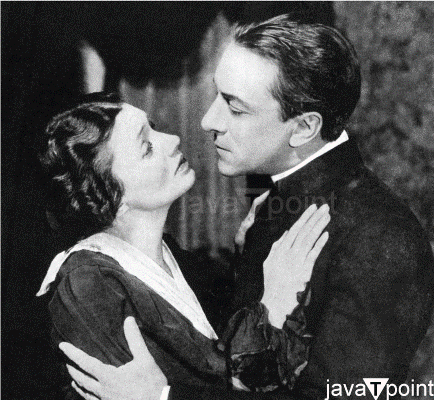
Wrapping It UpThe play is an intensely comical drama. It is a household drama that features elements of everyday life. For example, it has no adventure, magic, or hero/heroine stories. Three Acts make up the entire play. It begins in the morning and concludes in the final hour of the same day. Shaw, an iconoclast, is passionately committed to transforming society from a system of customs to one based on reason. Candida's ability to speak for herself is only possible because Shaw intended "a new woman" to emerge who would speak for all women in society and control opportunities. They must possess independence of spirit, self-assurance, clarity of thought, moral bravery, and emotional restraint. 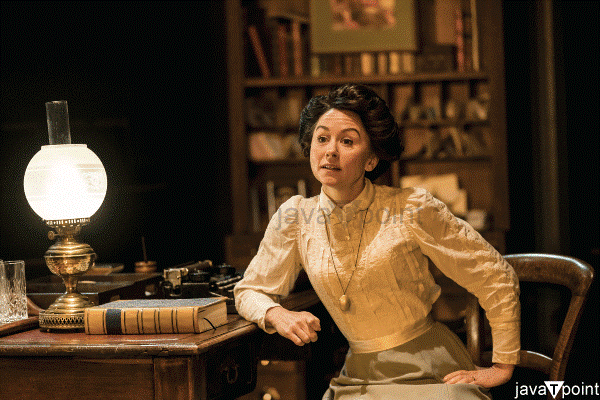
Shaw characterizes Eugene's journey as a discovery that Candida is not at all what he wants out of life and that the domestic love she might offer "is essentially the creature of limitations which are far transcended in his nature." When Eugene leaves, it's not"the night of despair and darkness, but the free air and holy starlight, which is so much more natural and atmosphere to him than this stuffy fireside warmth of mothers and sisters and wives and so on" as the poem states. Shaw claims that Eugene "is a god returning to his heaven, proud, unspeakably contemptuous of the 'happiness' he envied in the days of his blindness, clearly seeing that he has higher business on hand than Candida." On the other hand, Candida is "very immoral" and utterly misjudges Eugene's development throughout the play. |
 For Videos Join Our Youtube Channel: Join Now
For Videos Join Our Youtube Channel: Join Now
Feedback
- Send your Feedback to [email protected]
Help Others, Please Share









